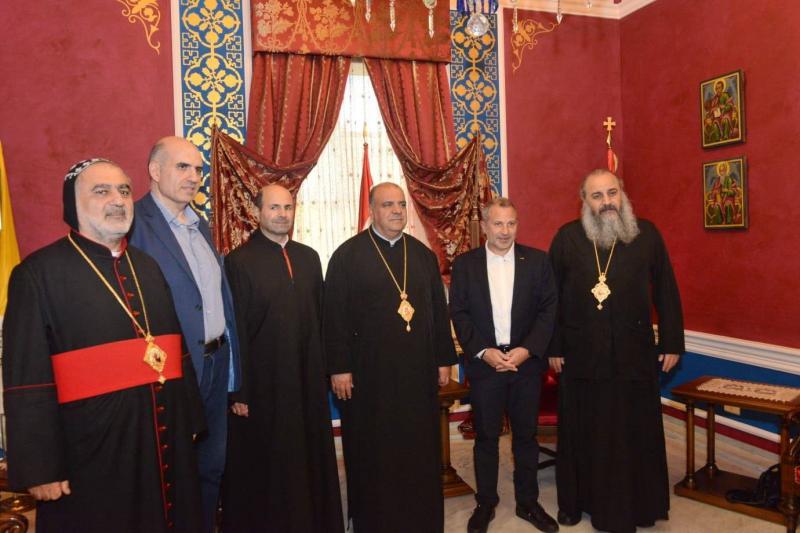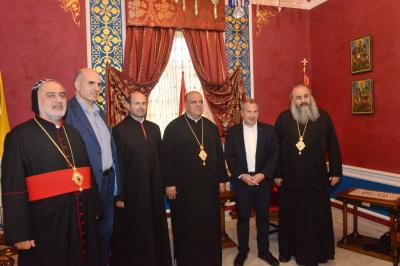The head of the "Free Patriotic Movement," MP Gebran Bassil, indicated today, Saturday, from the Eastern Orthodox Bishopric of Zahle that "what is happening to Christians and Lebanon is beyond mere disagreements. Christians should not fear for their diversity, democracy, and nature, which requires them to have different opinions; rather, they should fear that disagreements might affect their existence and role, as this poses an existential threat." He continued, "The situation in the country requires us to look at the next president's program and the program of the presidency. Here, we have submitted a paper of presidential priorities, and we can agree on its provisions to ensure a successful program for the next president."
Bassil pointed out that "Zahle has been represented in the ministry, administration, and parliament, and it is now at risk and besieged by a wave of displacement that could engulf it, as it can all of Lebanon, and we must deal with it responsibly. Our refusal of displacement is not based on racist or sectarian grounds, but rather on existential grounds, as our land and resources cannot bear more." He added, "The great responsibility in Zahle lies with the bishops, who must embody the human spirit with a people that has faced injustice, while others have different backgrounds for displacement. We have a responsibility to do what is necessary to protect the city, so that its residents can live amidst the greatest danger facing Lebanon in a hundred years."
Bassil argued that "in our national work, we think of Lebanon, but this does not negate that Zahle has a significant character and symbolism, and merely meeting in this edifice is evidence of the importance of Catholics and their presence and role." In a meeting with the bishop of the Maronite Diocese of Zahle, Bishop Joseph Maalouf, and other bishops, including Metropolitan Antonios Soubeih, Bishop Paul Safar, and Bishop Ibrahim Ibrahim, Bassil highlighted the importance of unity among the Christian community.
### Economic Bodies in Zahle
During his meeting with the economic bodies in Zahle, Bassil stated, "We do not think here except about the economy; we know many of you and know your capacity for production." He confirmed that Zahle's location allows it to be an economic center and serves as a gateway to our western and Gulf connections. Bassil pointed out, "Lebanon relies on individual efforts, and the state has always been an obstacle, which is why we continue with individual momentum," stressing that "decentralization and the credit fund are the means to drive the economy, and there is no solution for regional development without them."
### Visit to MP Cesar Maalouf's Residence
Bassil began his tour in Zahle with a visit to MP Cesar Maalouf's residence, where he held a breakfast in honor of Bassil, attended by MP Emil Rahme, MP Slim Aoun, former Minister Gaby Leyoun, former Minister Ghada Chreim, Director General of the Ministry of Agriculture Louis Lahoud, Zahle Mayor Asaad Zoghbi, and other party officials.
### Meeting with Miriam Skaf
The head of the "People's Bloc," Miriam Skaf, welcomed Bassil as part of his tour of political families and leaders in Zahle, at the residence of late Minister Elias Skaf. The meeting included members of the political bureau of the People's Bloc, MP Slim Aoun, and several of Bassil's MPs and advisors, discussing regional and Zahle-specific issues. Bassil expressed his strong interest in the development of Zahle and viewed it as a city at the heart of development and modernity, stating, "The house of Elias Skaf should remain open," praising Skaf's efforts for an open-door policy.
Skaf welcomed Bassil to her family's home, noting, "The current situation and the accumulated crises in all of Lebanon require solidarity and cooperation among all components." She asserted that "the extent of the economic and social disasters facing the Lebanese necessitates that everyone abandon trench politics and work together for rescue, because if the structure collapses, it will fall on everyone's heads."




